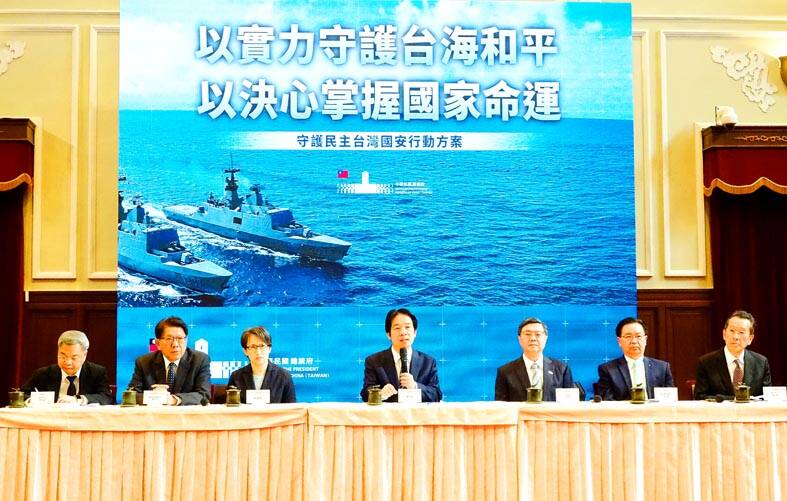The government is enacting the Comprehensive Action Plan to Establish Defense of Democracy Systems and the Comprehensive Action Plan to Invest in National Defense-related Industries to address threats against Taiwan and the Indo-Pacific region, President William Lai (賴清德) said yesterday.
There would be no compromise on national security, Lai said, citing the 1938 Munich Agreement and the 1951 Seventeen Point Agreement between Tibet and China as examples.
The defense of democracy plan tasks national security agencies to form a joint task force and provide solutions based on the theme of “democratic Taiwan versus China’s Taiwan,” he said.

Photo: Tien Yu-hua, Taipei Times
The task force would work with domestic groups and allied countries to demonstrate to the world Taiwan’s resolve to safeguard its democracy, uphold the “status quo” in the Taiwan Strait, and frustrate Chinese efforts to undermine the sovereignty of the Republic of China through its distortion of UN General Assembly Resolution No. 2758 and its alteration of history by misinterpreting documents, Lai said.
Both tactics seek to legitimize Beijing’s attempts to make Taiwan a part of China, he said.
The plans include enhancing Taiwanese national identity, making announcements during elections transparent and raising public awareness of Beijing’s attempts to intervene in Taiwan’s affairs, he said.
The government would establish a consensus that the “one country, two systems” solution is a red line for Taiwan, he said, urging all political parties, civic groups and legal persons to adhere to that consensus in interactions with China.
The national defense industries plan would promote and foster peace, Lai said.
Taiwan’s joint operations capability should be increased as much as possible before 2027 to pose an effective deterrent, and to create a resilient defense force by 2033 that can deter China and permanently defend “democratic Taiwan,” Lai said.
To achieve the goals, Taiwan would invest more than 3 percent of GDP into national defense next year and at least 5 percent by 2030, he said.
The government would produce an action plan to bolster national defense industries, which would help elevate industrial and economic development, Lai said.
The Executive Yuan would prepare a thorough plan so that spending on the plans does not take away from other government budgets, he said, adding that the Ministry of National Defense should ameliorate procurement procedures and regulations, and continue to purchase advanced equipment in line with the nation’s asymmetric warfare doctrine.
Boosting democracy is not provocation and Taiwan’s existence is not an excuse for others to upset the “status quo,” Lai said, adding that he hopes the nation would unite to safeguard the country and the freedom of its people.

AGING: As of last month, people aged 65 or older accounted for 20.06 percent of the total population and the number of couples who got married fell by 18,685 from 2024 Taiwan has surpassed South Korea as the country least willing to have children, with an annual crude birthrate of 4.62 per 1,000 people, Ministry of the Interior data showed yesterday. The nation was previously ranked the second-lowest country in terms of total fertility rate, or the average number of children a woman has in her lifetime. However, South Korea’s fertility rate began to recover from 2023, with total fertility rate rising from 0.72 and estimated to reach 0.82 to 0.85 by last year, and the crude birthrate projected at 6.7 per 1,000 people. Japan’s crude birthrate was projected to fall below six,

US President Donald Trump in an interview with the New York Times published on Thursday said that “it’s up to” Chinese President Xi Jinping (習近平) what China does on Taiwan, but that he would be “very unhappy” with a change in the “status quo.” “He [Xi] considers it to be a part of China, and that’s up to him what he’s going to be doing, but I’ve expressed to him that I would be very unhappy if he did that, and I don’t think he’ll do that. I hope he doesn’t do that,” Trump said. Trump made the comments in the context

SELF-DEFENSE: Tokyo has accelerated its spending goal and its defense minister said the nation needs to discuss whether it should develop nuclear-powered submarines China is ramping up objections to what it sees as Japan’s desire to acquire nuclear weapons, despite Tokyo’s longstanding renunciation of such arms, deepening another fissure in the two neighbors’ increasingly tense ties. In what appears to be a concerted effort, China’s foreign and defense ministries issued statements on Thursday condemning alleged remilitarism efforts by Tokyo. The remarks came as two of the country’s top think tanks jointly issued a 29-page report framing actions by “right-wing forces” in Japan as posing a “serious threat” to world peace. While that report did not define “right-wing forces,” the Chinese Ministry of Foreign Affairs was

PREPAREDNESS: Given the difficulty of importing ammunition during wartime, the Ministry of National Defense said it would prioritize ‘coproduction’ partnerships A newly formed unit of the Marine Corps tasked with land-based security operations has recently replaced its aging, domestically produced rifles with more advanced, US-made M4A1 rifles, a source said yesterday. The unnamed source familiar with the matter said the First Security Battalion of the Marine Corps’ Air Defense and Base Guard Group has replaced its older T65K2 rifles, which have been in service since the late 1980s, with the newly received M4A1s. The source did not say exactly when the upgrade took place or how many M4A1s were issued to the battalion. The confirmation came after Chinese-language media reported